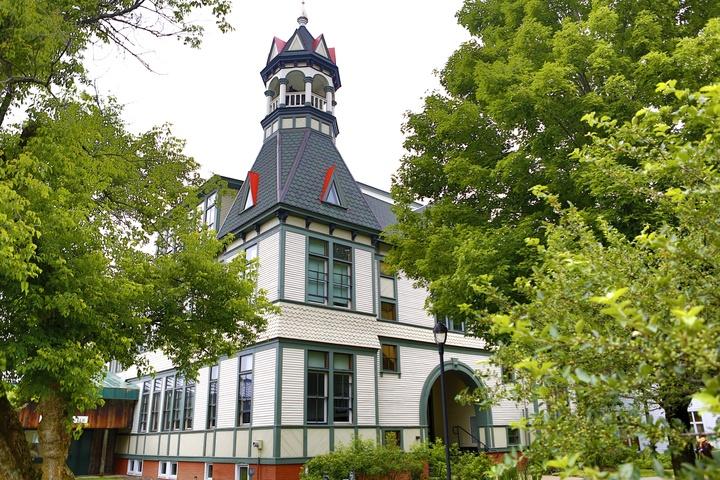Don't Give Up on Vermont Law School
We lose a lot if VLS does not return to its former strength, or worse, closes. Support the school and you support Yale, Quinnipiac and the next generation of lawyers, especially environmental lawyers who may be the ones to save the planet.
August 15, 2019 at 02:23 PM
3 minute read
 Vermont Law School
Vermont Law School
We in Connecticut have a special interest in Vermont Law School because so many alumni live and practice here, and the school has done a great job in educating a generation of committed environmental lawyers. Vermont Law School, an independent school and the only law school in Vermont, has been at the forefront of environmental law education and advocacy since its founding in 1972, and modest beginnings in an old schoolhouse in the sleepy little town of South Royalton.
But today, VLS is floundering, up to its neck in debt brought on by the sagging enrollment caused by the Great Recession and struggling to stay afloat with a totally inadequate endowment. Applications, admissions and enrollment are up, but the improvements are recent and follow too many years of financial losses.
The most recent difficulty arises out of the dean’s precipitous and ill-considered action in taking tenure away from 14 professors. It was a desperate move in the face of a deficit that seemed insurmountable without drastic budget cutting. Somewhere in this ham-handed restructuring, the notion of due process got lost. The American Association of University Professors jumped in, investigated and issued a devastating report. On June 15, AAUP delegates voted to add VLS to its “list of institutions sanctioned for serious departures from AAUP-supported standards of academic governance.” There are just six schools on the sanction list. A lesser AAUP denunciation is censuring. There are 58 institutions on that list.
While the dean is responsible for the sanctions, VLS as an institution, and its faculty and students deserve our support in moving forward. We need trained stewards of the environment, especially now with the threat of extinction, just reported by the United Nations, of one million species. Any hope of reducing those losses, and combatting other environmental problems such as climate change, will depend on the rule of law and able lawyers.
We can support VLS in two ways. First, those who want to see the school survive can seek to understand what happened, why the dean felt compelled to take the action he did, and what the AAUP report reveals—and then be ready to counsel prospective students that there remains much to be gained in attending VLS.
Second, we can help to promote the joint degree programs that bind us here in Connecticut with our neighboring institution to the north. There is a joint program with Yale. The Juris Doctor/Master of Environmental Management (JD/MEM) Program requires four years in residence at both schools—two and a half years at VLS, and one and a half years at Yale School of Forestry and Environmental Studies. The joint degree candidates are able to “share” the equivalent of 12 credits between the two programs. And there is one with the Quinnipiac University School of Law in which in three years Quinnipiac students receive their law degree from Quinnipiac and their master’s in environmental law and policy from Vermont Law School. For those wishing to partner with schools at more distant venues, there are joint degree programs at the University of Cergy-Pontoise in France and the University of Cambridge in England.
We lose a lot if VLS does not return to its former strength, or worse, closes. Support the school and you support Yale, Quinnipiac and the next generation of lawyers, especially environmental lawyers who may be the ones to save the planet.
This content has been archived. It is available through our partners, LexisNexis® and Bloomberg Law.
To view this content, please continue to their sites.
Not a Lexis Subscriber?
Subscribe Now
Not a Bloomberg Law Subscriber?
Subscribe Now
NOT FOR REPRINT
© 2025 ALM Global, LLC, All Rights Reserved. Request academic re-use from www.copyright.com. All other uses, submit a request to [email protected]. For more information visit Asset & Logo Licensing.
You Might Like
View All
ADVANCE Act Offers Conn. Opportunity to Enhance Carbon-Free Energy and Improve Reliability With Advanced Nuclear Technologies

Trending Stories
Who Got The Work
J. Brugh Lower of Gibbons has entered an appearance for industrial equipment supplier Devco Corporation in a pending trademark infringement lawsuit. The suit, accusing the defendant of selling knock-off Graco products, was filed Dec. 18 in New Jersey District Court by Rivkin Radler on behalf of Graco Inc. and Graco Minnesota. The case, assigned to U.S. District Judge Zahid N. Quraishi, is 3:24-cv-11294, Graco Inc. et al v. Devco Corporation.
Who Got The Work
Rebecca Maller-Stein and Kent A. Yalowitz of Arnold & Porter Kaye Scholer have entered their appearances for Hanaco Venture Capital and its executives, Lior Prosor and David Frankel, in a pending securities lawsuit. The action, filed on Dec. 24 in New York Southern District Court by Zell, Aron & Co. on behalf of Goldeneye Advisors, accuses the defendants of negligently and fraudulently managing the plaintiff's $1 million investment. The case, assigned to U.S. District Judge Vernon S. Broderick, is 1:24-cv-09918, Goldeneye Advisors, LLC v. Hanaco Venture Capital, Ltd. et al.
Who Got The Work
Attorneys from A&O Shearman has stepped in as defense counsel for Toronto-Dominion Bank and other defendants in a pending securities class action. The suit, filed Dec. 11 in New York Southern District Court by Bleichmar Fonti & Auld, accuses the defendants of concealing the bank's 'pervasive' deficiencies in regards to its compliance with the Bank Secrecy Act and the quality of its anti-money laundering controls. The case, assigned to U.S. District Judge Arun Subramanian, is 1:24-cv-09445, Gonzalez v. The Toronto-Dominion Bank et al.
Who Got The Work
Crown Castle International, a Pennsylvania company providing shared communications infrastructure, has turned to Luke D. Wolf of Gordon Rees Scully Mansukhani to fend off a pending breach-of-contract lawsuit. The court action, filed Nov. 25 in Michigan Eastern District Court by Hooper Hathaway PC on behalf of The Town Residences LLC, accuses Crown Castle of failing to transfer approximately $30,000 in utility payments from T-Mobile in breach of a roof-top lease and assignment agreement. The case, assigned to U.S. District Judge Susan K. Declercq, is 2:24-cv-13131, The Town Residences LLC v. T-Mobile US, Inc. et al.
Who Got The Work
Wilfred P. Coronato and Daniel M. Schwartz of McCarter & English have stepped in as defense counsel to Electrolux Home Products Inc. in a pending product liability lawsuit. The court action, filed Nov. 26 in New York Eastern District Court by Poulos Lopiccolo PC and Nagel Rice LLP on behalf of David Stern, alleges that the defendant's refrigerators’ drawers and shelving repeatedly break and fall apart within months after purchase. The case, assigned to U.S. District Judge Joan M. Azrack, is 2:24-cv-08204, Stern v. Electrolux Home Products, Inc.
Featured Firms
Law Offices of Gary Martin Hays & Associates, P.C.
(470) 294-1674
Law Offices of Mark E. Salomone
(857) 444-6468
Smith & Hassler
(713) 739-1250












